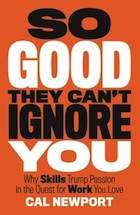
RATING: 9/10
Become so good they can’t ignore you, that is Cal Newport’s advice. Ditch the common “how do I discover my passion?” mindset. He argues working right trumps finding the right work. Through continually building up skills (“career capital”) you can leverage this capital to cash in on interesting rewards, i.e. autonomy, financial, creative, etc.
The Big Idea: You don’t discover your passion “out there,” you gradually build up skills and opportunities to become more passionate about your work. Working right trumps finding the right work. As a starting point, identify the lifestyle you want to live and find careers that can support that. Find examples in the field and “crack their code.”
Notes:
Compelling careers often have complex origins that reject the simple idea that all you have to do is follow your passion.
A job is a way to pay the bills, a career is a path toward increasingly better work, and a calling is work that’s an important part of your life and a vital part of your identity.
The craftsman mindset focuses on what you can offer the world, the passion mindset focuses instead on what the world can offer you.
Basic economic theory tells us that if you want something that’s both rare and valuable, you need something rare and valuable to offer in return—this is supply and demand.
Even at that young age I realized that my discomfort with mental discomfort was a liability in the performance world.
If you just show up and work hard, you’ll soon hit a performance plateau beyond which you fail to get any better.
Does he annoy some people because of his lack of availability? Probably. But take my example of eventually being forced to call him during his commute: The important stuff still finds it ways to him, but on his schedule.
The entertainment industry is not an auction market; it’s instead winner-takes-all. If you want a career in television writing, as Alex discovered, only one thing matters: the quality of your scripts.
This is what you should experience in your own pursuit of “good.” If you’re not uncomfortable, then you’re probably stuck at an “acceptable level.”
Soon after we met, she revealed that her embrace of control led her to an extreme position: dropping out of college. It didn’t take her long to realize that just because you’re committed to a certain lifestyle doesn’t mean you’ll find people who are committed to supporting you.
I have this principle about money that overrides my other life rules, Derek said. “Do what people are willing to pay for.”
Money is a neutral indicator of value. By aiming to make money, you’re aiming to be valuable.
LAW OF FINANCIAL VIABILITY: When deciding whether to follow an appealing pursuit that will introduce more control into your work life, seek evidence of whether people are willing to pay for it. If you find this evidence, continue. If not, move on.
If your goal is to love what you do, you must first build up “career capital” by mastering rare and valuable skills, and then cash in this capital for the traits that define great work. Mission is one of these desirable traits, and like any such desirable trait, it too requires that you first build career capital—a mission launched without this expertise is likely doomed to sputter and die.
A good career mission is similar to a scientific breakthrough—it’s an innovation waiting to be discovered in the adjacent possible of your field.
If you want to identify a mission for your working life, therefore, you must first get to the cutting edge—the only place where these missions become visible.
LAW OF REMARKABILITY: For a mission-driven project to succeed, it should be remarkable in two different ways. First, it must compel people who encounter it to remark about it to others. Second, it must be launched in a venue that supports such remarking.
You can’t skip straight into a great mission without first building mastery in your field.
To try to devise a mission when you’re new to a field and lacking any career capital is a venture bound for failure.
